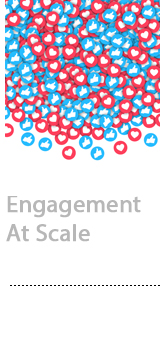
While Facebook’s earnings last Tuesday prove that marketers still spend, some wonder if consumer backlash against the platform could one day damage brands advertising on it.
“The slow stream of press has caused more angst and questions,” said James Douglas, executive director and head of media at performance agency Reprise. “Every day it seems like another room in the Facebook house is catching fire.”
Even leading agency executives have called for their peers to boycott Facebook. IPG Mediabrands CEO Mat Baxter said the industry should “take a collective stand against the egregious behavior of Facebook,” in a LinkedIn post last month.
While the sentiment seems noble, the reality is that Facebook really performs. And there aren’t many alternatives that can replace the scale and engagement of its 2.7 billion users across Instagram, WhatsApp and the core Facebook app.
For some marketers, it’s a Catch-22.
“Facebook absolutely works,” Douglas said. “It helps sell products, change perceptions and increase awareness. To give that up would be quite challenging to us all.”
Who are the alternatives?
Facebook has its fair share of brand safety issues, but it’s often regarded as safer than the open programmatic exchange. And when it comes to mobile, nothing beats Facebook’s scale.
“Facebook has, frankly over Google, become a proxy for what quality mobile advertising is,” said Noah Mallin, head of content and experience at Wavemaker.
But if marketers did become uncomfortable with spending on Facebook, that budget would likely be redirected to other walled gardens like Amazon or YouTube.
“That’s where audiences spend their time,” Douglas said.
But those platforms might also have the same customer data issues that Facebook has – they’re just getting away with it, for now.
“A lot of what Facebook is getting raked over the coals for, Google has similar problems,” Mallin said. “They just don’t seem to be the No. 1 target.”
Amazon might have a better chance at attracting brand budgets because it hasn’t had any major privacy scandals. But only companies selling on Amazon get the most out of it as an ad platform. And while Twitter and Snap offer a similar engagement style as Facebook, they’re not nearly as scaled.
“Your choices are relatively limited,” Mallin said.
Can the open exchange replace Facebook?
It’s possible to replicate Facebook’s scale when buying on an open exchange, said Christian Juhl, global CEO at Essence, since consumers don’t use the Facebook ecosystem all the time.
“If you can replace that audience in a trusted environment, then you haven’t given up anything,” he said.
But the open exchange isn’t always trusted by brands, as it’s been notorious for issues around brand safety, transparency and fraud. It also doesn’t have access to Facebook’s trove of user data.
“Programmatic is not going to perform as well, most likely,” Mallin said.
One area where marketers could look to replicate Facebook’s scale is mobile gaming, with publishers like Activision Blizzard or King. These platforms have a growing audience that are often more diverse and engaged than advertisers realize, Mallin said.
But until consumers stop living their lives on its platforms, Facebook will be difficult to replace. And besides a few meager attempts to #DeleteFacebook, there’s no evidence consumers are really moving away from the platform.
“What would replace it?” Douglas said. “We’d really be talking about a systematic change in people’s lives.”
How to hold Facebook accountable
If marketers aren’t ready to close their purse strings, they have very little leverage over holding it accountable as an ad platform.
Most are simply demanding Facebook get its act together, either by hiring an independent review board, replacing executive leadership or bringing in outside critics.
“I would be very surprised and disappointed if Facebook did not make significant changes around data standards and controls this year,” said Daryl Lee, global CEO at UM. “There will be an expectation that will happen.”
In addition to creating tighter data controls, Facebook could bring in an executive from the agency world to represent an advertiser point of view.
“There’s a role for advertisers to play in encouraging Facebook to continue to have better controls over their platform overall,” Douglas said.
Brands might also might shift their budgets within Facebook to more lean-back products like Facebook Watch, which offer a more premium environment with unique IP.
“I think they see that as a potential safe haven for brands that are worried about that sort of thing,” Mallin said.
But until another platform emerges that can mirror not only Facebook’s scale but its sophistication as an ad platform and its access to consumer data, marketers will be hard pressed to find a replacement. Moving away from Facebook could lead to a winnowing of available consumer data for brands in the digital ad ecosystem.
“We’re addicted to social not just because it’s where all of our friends are, but because from an advertising perspective, it works,” Douglas said. “And Facebook absolutely works.”
This post was syndicated from Ad Exchanger.


More Stories
TVNZ, AIA NZ, Together and NZME team up for new mental wellbeing series
Google Delays Cookie Deprecation For The Third Time
TGF launches new brand identity for Waste Management NZ